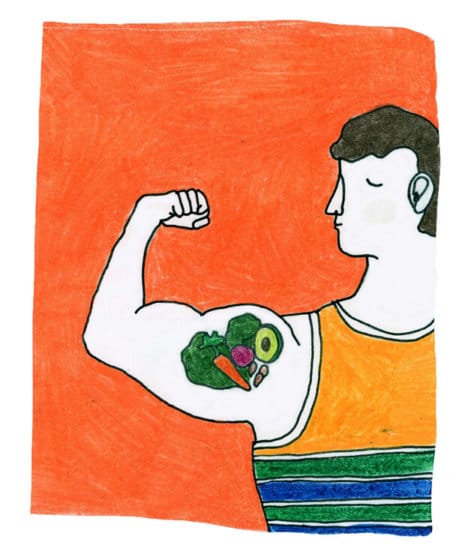
Mt. A athletes discuss making the switch to plant-based diets
Competitive athletics are often associated with heavy diets that mainly consist of high-protein meat and animal products. Some Mount Allison athletes have been making the switch to vegetarian and vegan diets, meeting their dietary needs without consuming meat.
Fourth-year biochemistry student Elizabeth Baker began following a vegan diet two years ago and continues to play on both the badminton and soccer teams. Baker was initially attracted to plant-based diets for the health benefits many report, as well as the reduction of environmental stress that a plant-based diet may cause.
“A vegan diet drastically reduces your environmental impact,” Baker said, “so I figured if I can do that while also contributing to the minimization of animal cruelty, and eat super healthy, why not?”
Since making the switch, Baker said she has not noticed any changes to her performance as an athlete, and said she has since experienced an overall improvement in her health.
To maintain the high energy level required for participation in two varsity sports, Baker found that she did have to adjust her quantity of food intake.
“I personally have to eat a lot to stay energized,” Baker said, “so that means really big portions with lots of nutritional value.”
Baker sai she does not use dietary supplements to meet her protein requirements. “I try to get all my essential nutrients from whole foods, so that’s another reason why I eat so much and in large portions,” she said.
Health Canada attests that individuals can meet their dietary requirements while restricting animal products, substituting soy beverages over milk and a variety of meat alternatives such as beans, lentils, tofu, nuts and seeds. Athletes can adjust their diets to fulfill their nutritional requirements by following Health Canada’s food guide, while consuming larger portions in order to sustain their energy level.
Jeshua Becker, fourth-year basketball player and environmental science student, has been following a vegan diet for the past year. “I decided to make the switch because I was having a hard time keeping up my energy level during the [basketball] season,” Becker said, “and since then I’ve found that I’m a lot less tired.”
Becker said he has found that the increased level of energy he associates with his dietary change has helped him with sport performance in general.
Becker said he did not experience any weight loss after cutting animal-based products out of his diet. “I have to eat a lot of food to maintain my weight and energy,” Becker said, “and I take dietary supplements like vitamin B12 and plant-based protein shakes.”
Katherine Ollerhead, a fourth-year biochemistry student, follows a vegetarian diet while playing for the varsity basketball and soccer teams. Ollerhead first adopted a vegetarian diet 12 years ago, and said she continued for health-related reasons, mentioning that a vegetarian diet lowers cholesterol levels and decreases the risk of developing cancer.
Ollerhead said that while she does not strictly monitor her diet, it is important for her to meet certain dietary requirements. “The key is just to make sure you get enough protein,” she said.
Despite her demanding athletic regimen, Ollerhead said she has not experienced an energy depletion while following a vegetarian diet.
Athletes engaging in vegetarian and vegan diets may be a testament to how restricting the intake of animal-based products does not necessarily result in energy depletion. Plant-based diets continue to support Mount Allison students participating in multiple university sports at a varsity level.
“I personally feel like a vegan diet is the easiest and best way to live an overall more ethical and healthy life,” Baker said.





